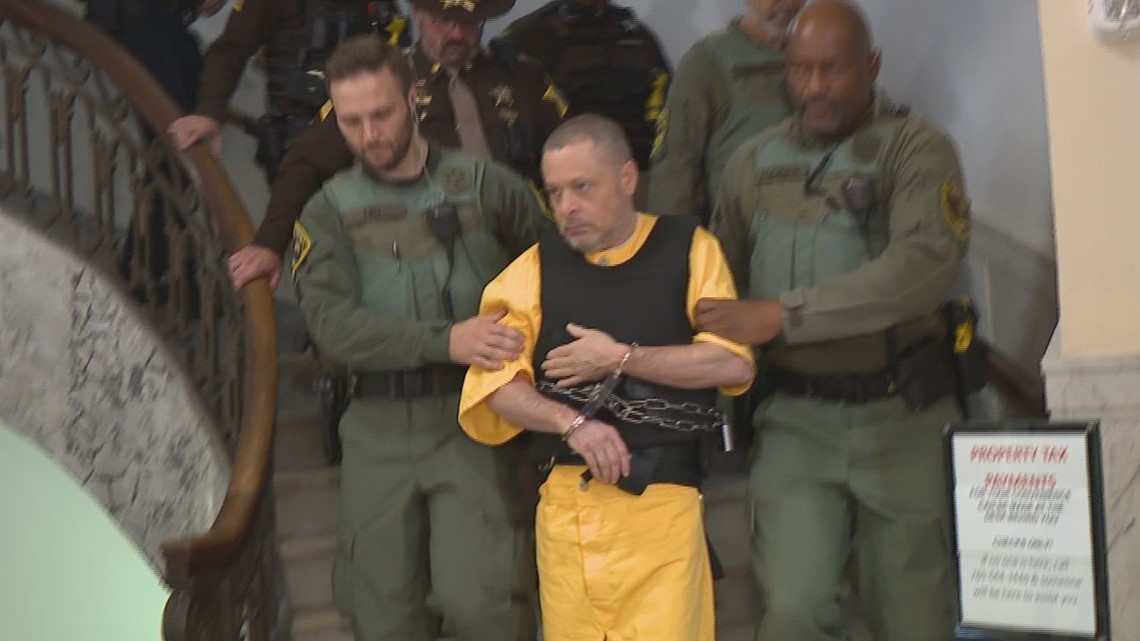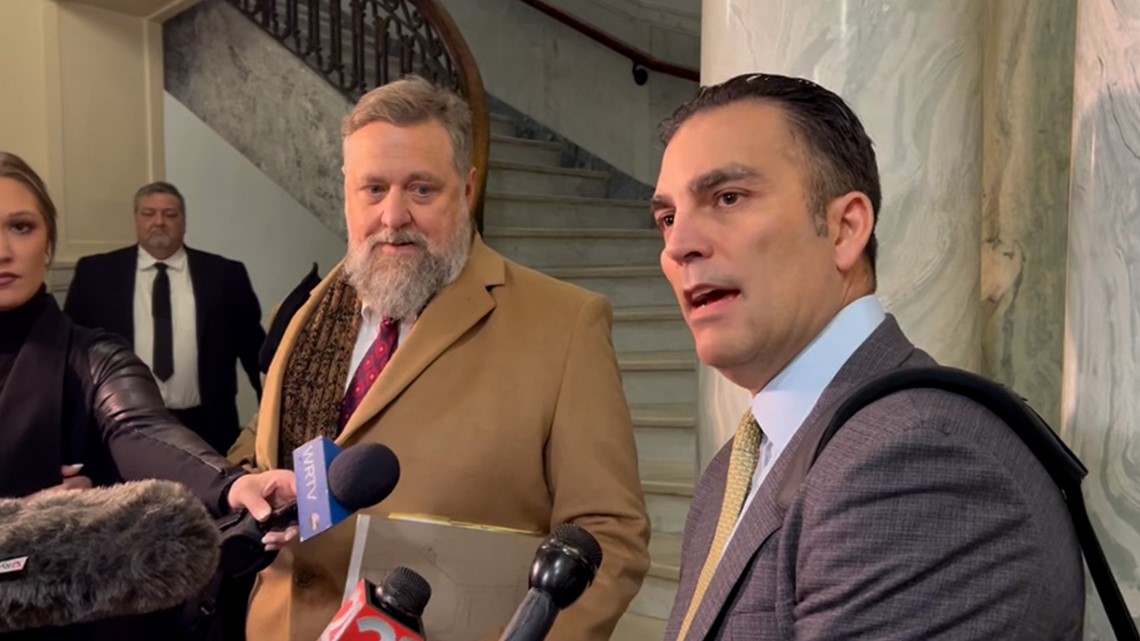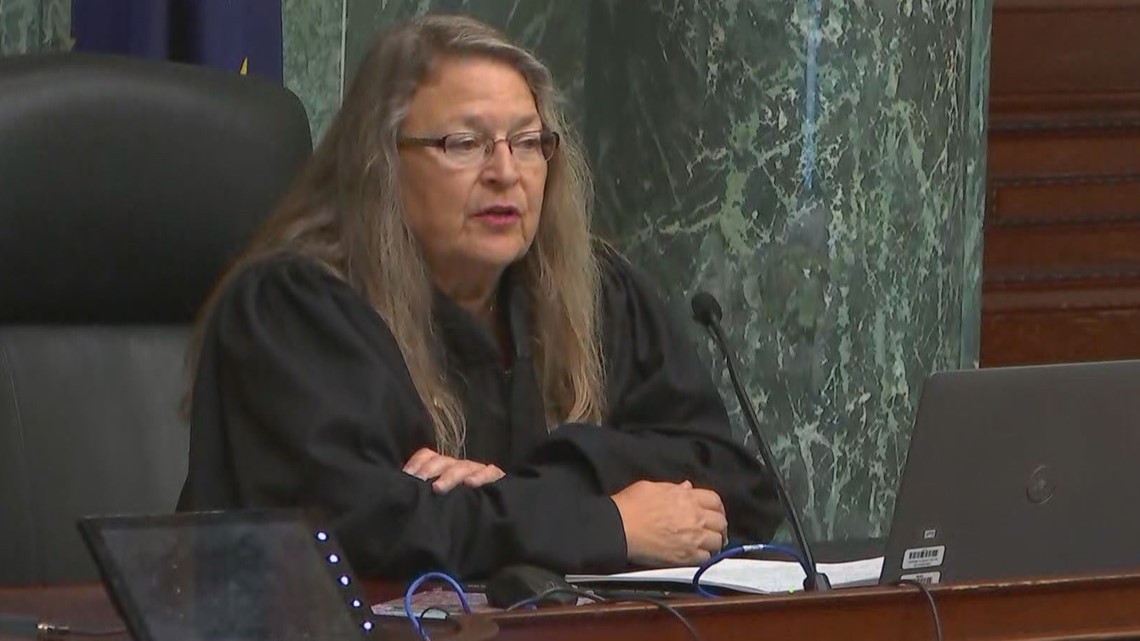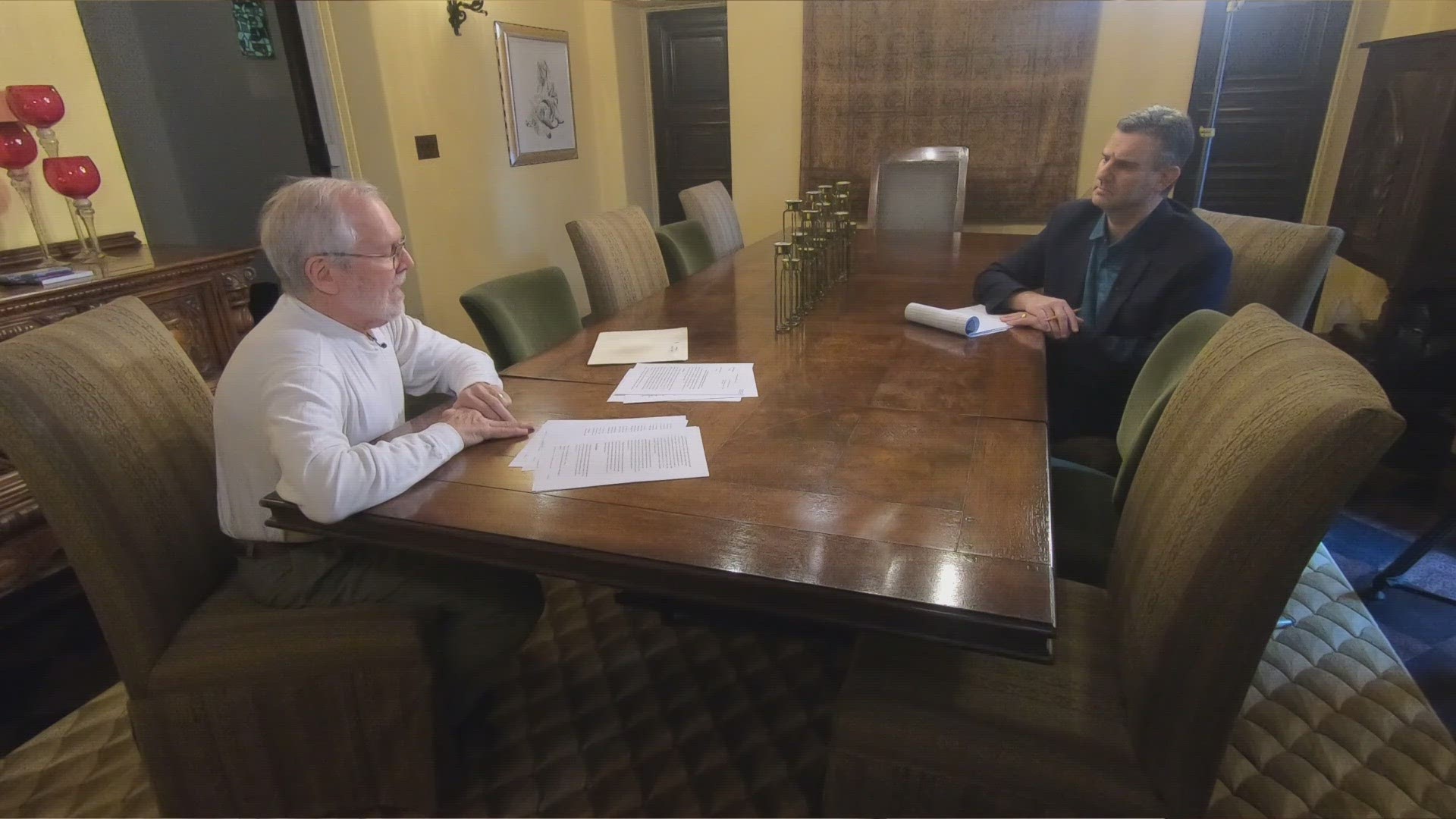INDIANAPOLIS — The Indiana Supreme Court released its opinions for reinstating Richard Allen's original attorneys to the case and choosing to keep the judge in the Delphi murders case.
The decision to keep judge Frances Gull was unanimous, but the court was split on whether or not to reinstate Allen's original attorneys.
Allen is accused of killing 13-year-old Abby Williams and 14-year-old Libby German in February 2017.
In the majority of the justices' explanation of the decision to reinstate Allen's attorneys, the justices said "this case presents extraordinary circumstances where denying a writ will result in substantial injustice, and Allen’s petition is not a substitute for an adequate appellate remedy."
The justices said by disqualifying Allen's attorneys, Andrew Baldwin and Bradley Rozzi, it "delayed his trial by at least nine months." The justices also said that, because Allen is being kept in a state prison for his safety before the trial, extending that for an additional amount of time because of new attorneys being appointed has "no adequate appellate remedy."


The justices also claim Gull "lacked the authority to remove counsel" without "considering other, less drastic options" and "weighing the prejudice to Allen."
The justices claim that if the Supreme Court did not intervene to reinstate Allen's attorneys, and he were to get the conviction vacated on an appeal over that issue, it could produce years of further delays.
The justices said, "Our Court has been “generally of the view that a trial court is limited in its authority to remove a criminal defendant’s court‐appointed counsel.”
The Supreme Court justices then lay out three criteria where a judge could remove a defendant's counsel over the objection of the defendant and their counsel:
- Disqualification is a last resort
- Disqualification is necessary to protect the defendant’s constitutional rights, to ensure the proceedings are conducted fairly and within our profession’s ethical standards, or to ensure the orderly and efficient administration of justice
- Those interests outweigh the prejudice to the defendant
As such, the justices said the judge could have handled her issues with Allen's attorneys through regular court proceedings, so it wasn't a last resort. The justices said his attorneys have years, if not decades, of experience that makes them qualified to act as his counsel, and that his attorneys' statements on the case did not undermine his defense. Thirdly, the justices said Gull's concerns do not outweigh "the substantial prejudice to Allen from substituting counsel."
In the dissenting opinion, Justice Geoffrey G. Slaughter explained his argument against reinstating Allen's attorneys. He said Gull "did not violate an absolute duty in dismissing court-appointed counsel because Allen does not have an unquestioned right to keep them."
Slaughter goes on to say, "While the trial judge’s actions raise a potential constitutional problem, under current law it is far from clear she exceeded her authority."
Slaughter emphasizes concern that there are already procedural remedies in place for appealing his concerns, but that creating a new rule – in deciding in favor of Allen's motion – should not happen. He said that after his fellow justices announced the new rule, they found Gull was in breach of it, and so they ruled to reinstate his original attorneys.
While Slaughter believes the Supreme Court's decision strikes a "reasonable balance," he is concerned it held Gull accountable when she did not have the benefit of the rule when making her original decision.
Slaughter also claims Allen failed to show he could not get relief through appeal. He concludes by saying:
"The Court today flouts our original-action rules to award extraordinary mandamus relief in favor of Allen and against the trial judge. In doing so, we allow Allen to short circuit the appellate process, muddy our own jurisprudence in this important area, and invite future deviations from our rules. In my view, these institutional costs far outweigh the benefits to Allen."


The justices all agreed Allen's request for a speedy trial was denied by the justices as his attorneys never filed the paperwork with the court, and Gull would need to be the one to first rule on that.
In the explanation on why to keep Gull on the case, which was unanimous amongst the justices, they argued nothing in the judge's decision to disqualify Allen's original attorneys shows bias or prejudice against Allen. They said it appeared to them that she was "trying to protect Allen's right to effective assistance of counsel." Additionally, the justices found Allen did not point to "anything suggesting the special judge is biased against Baldwin and Rozzi."
The justices further explained by saying, "Though she [Gull] mistakenly hit defense counsel’s eject button instead of the case’s lockdown button, she was right to try to get the situation under control quickly and decisively. Her efforts did not reflect any bias or prejudice..."
The justices concluded by saying any petitions to rehear or reconsider their rulings will not be allowed.
RELATED: 'Recorded over' | Richard Allen's attorneys claim key evidence destroyed in Delphi murders case
Timeline and how it unfolded
Carroll County Judge Benjamin Diener had Allen transferred to the Department of Correction (DOC) for his safety while he awaits trial. Diener then recused himself from the case.
Gull was then appointed as a special judge. Baldwin and Rozzi were appointed as Allen's attorneys "at public expense."
A year later, Gull said she lost faith in their ability to assist Allen. That lack of faith stemmed from a leak of confidential case materials, including crime scene photos. In August 2023, a former employee of Baldwin visited his office and secretly copied discovery materials, crime scene photos and distributed them to others.
After discovering the leak, Baldwin and Rozzi notified the special judge and prosecutor on Oct. 6.
Two days later, prosecutor Nick McLeland emailed the defense team and judge that the person the former employee gave those materials to killed themself, hours after that person refusing to answer questions from Indiana State Police about the leak.
Gull responded to the email by saying she was “deeply concerned Mr. Allen’s defense is being compromised by all these recent events.”
She then directed the defense attorneys to stop working on the case until Oct. 19, so she could discuss developments with all parties.
Allen wrote a letter in the meantime, wanting to keep Rozzi and Baldwin.


Counsel for both sides met with Gull in her chamber before the Oct. 19, during which point she told Baldwin and Rozzi they had demonstrated “gross negligence and incompetence.”
She said the attorneys failed to:
- Safeguard confidential case material
- Emailed confidential work products to an unauthorized person
- Failed to report the leak
- Made extrajudicial statements about the case
Included inaccurate statements
She then informed the court she decided to disqualify Baldwin and Rozzi, and offered to let them “save face by withdrawing from the case so that she wouldn’t have to go into a public hearing a few minutes later” and publicly explain why she believed they were “grossly negligent and ineffective."
Baldwin and Rozzi said they would withdraw, Gull accepted, and she publicly said there was an “unexpected turn of events.”
However, after a few days, Baldwin and Rozzi had reconsidered – and neither Baldwin or Rozzi ever actually filed a written motion that would have required them to withdraw.
Instead, Rozzi filed a notice that he would not withdraw and would represent Allen. He also filed a motion to disqualify Gull on Allen’s behalf.
The trial court struck both filings and ordered the clerk to remove them from record because Rozzi was no longer counsel. She also appointed two new public defenders.


Baldwin, on his part, filed a Motion to Reconsider, saying he would not file a written motion to withdraw and did not consider his oral withdrawal effective and would continue representations.
They entered new appearances as Allen’s privately-attained pro bono counsel.
After a hearing on Oct. 31, the court entered an order saying nothing changed in the intervening 12 days that would have changed Gull’s mind. The court disqualified them still and changed the trial date to Oct. 15, 2024.
On Nov. 6, 2023, Allen petitioned the Indiana Supreme Court and asked for the reinstatement of Baldwin and Rozzi, his trial to begin within 70 days after the writ is issued and replace the special judge.
The Indiana Supreme Court heard arguments on Jan. 18, 2024. A writ was issued later that day granting Allen’s first request but denying his other two.
Leak of evidence
In the filing to the Indiana Supreme Court, Allen's attorneys claim he was made aware that a friend and former employee of attorney Andrew Baldwin had photographed crime scene evidence in Baldwin's office and then released it without consent.
A letter from Allen's attorney, Bradley Rozzi, informed the judge to the theft on Oct. 6. Judge Gull responded, saying in part, "Thank you for passing on this troubling information."
Prosecutor Nicholoas McLeland then emails the judge and Allen's attorneys that the incident was investigated by Indiana State Police and that several people were identified. The first being the friend and former employee who had photographed the evidence and the others who had disseminated it. One of those allegedly involved would take their own life.
The judge then responded to that news saying, "I'm deeply concerned that Mr. Allen's defense is being compromised by all these recent events and set an Oct. 19 hearing.” She then ordered the original defense team to stop working on the case.
Documents filed Monday with the Supreme Court include an Oct. 11 letter from Allen to the judge in which Allen said he had been made aware of the evidence leak and still wanted to keep Baldwin and Rozzi as his defense attorneys.
Before that hearing, the filing includes an Oct. 11 letter purportedly from Allen to the judge in which he claims he was made aware of the theft and still wanted to keep Baldwin and Bradley Rozzi as his attorneys.
However, at a hearing on Oct. 19, the judge said she accepted Baldwin's verbal withdrawal from the case that day and that she expected Rozzi to submit a written withdrawal in the next few days. His attorneys later claimed Judge Frances Gull forced their withdrawal.
According to a later court filing from Rozzi, the defense and prosecutor met with Judge Gull prior to the Oct. 19 hearing when the judge read a prepared statement to Rozzi and Baldwin, identifying various issues throughout the case of the defense exercising "gross negligence" in carrying out their responsibilities for Allen.
In his filing, Rozzi then says says the judge then gave Rozzi and Baldwin two options:
- Voluntarily withdraw their appearances and exit the courthouse in advance of the hearing
- Participate in the 2 p.m. hearing, and the judge would read a prepared statement into the record and then disqualify both Rozzi and Baldwin in the presence of Allen, his family and the public.
According to the filing, the defense then spoke with Allen, who allegedly reaffirmed he wanted to continue being represented by Rozzi and Baldwin — and Allen allegedly still objects to the judge taking Baldwin and Rozzi off the case.
In court filing, Rozzi said the judge "had engaged in an ambush of defense counsel, entirely void of due process." Rozzi said he agreed to withdraw his appearance but says he was coerced and did not do it voluntarily.
An order by Gull was entered into record Oct. 19 — after the hearing — in which she ordered Rozzi and Baldwin withdrawn from the case. She then ordered the clerk to remove them as attorneys of record in the case. Subsequent filings by Rozzi were then ordered removed from court record by the judge.
Rozzi is also requesting Gull remove herself from the case. The attorney is asking for her recusal, claiming she has shown her "impartiality might reasonably be questioned."
Rozzi goes on to claim Gull violated the Indiana Supreme Court’s Administrative Rules by removing or concealing some of the defense’s pleadings from the case summary.

